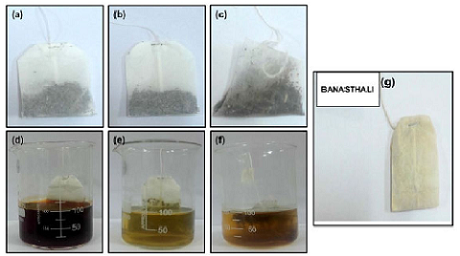A team of Indian researchers develop a low-cost method to remove fluoride from drinking water with specially made teabag-like pouches. The new method uses pouches covered with nanoparticles synthesized from organically-grown jojoba seeds to remove fluoride from water. The estimated cost of each pouch is about Rs 3, which makes the technology most suitable for rural communities.
Jaipur (ISW) – A team of Indian researchers have developed a low-cost method to remove fluoride from drinking water with specially made teabag-like pouches.
The new method uses pouches covered with nanoparticles synthesized from organically-grown jojoba seeds to remove fluoride from water. Jojoba is easily available and nanoparticles used (iron and aluminum) are synthesized from waste byproducts of oil extraction process from jojoba seeds.
After synthesis, nanoparticles were soaked onto a foam material—polyurethane foam—wherein the nanoparticles get stuck to the surface of the foam. Infusion pouches or bags were then made from the nanoparticle-coated foam sheet. The nanoparticles on the pouches attract fluoride in the water and they too get stuck to the surface of the pouch.
The cost-effective design and green design was made by researchers led by Dr Suphiya Khan and Sonu Kumari from Department of Bioscience and Biotechnology at Banasthali Vidyapith in Rajasthan. All that one will need to do is to dip the special pouch in water and it will remove fluoride from water. They have also tested the same method with infusion bags filled with tea as tea is known to accumulate a lot of fluoride.
Results of the fluoride analysis published in journal Scientific Reports show that after 80 minutes no more fluoride was collected as all the empty spaces on the surface were used up. When tested with pouches filled with tea, it was found that large amounts of fluoride got collected in black, green and jasmine tea samples, but black tea accumulated the highest amount.
While small amounts of fluoride are required for the development of bones and teeth, excess of its can cause fluorosis —a disease known to cause spotting of the teeth enamel, weak bones, thyroid and kidney problems. Fluoride-contaminated ground water is a serious health issue in several parts of the country.
Fluoride is a major contributor to the world water crisis, affecting about 200 million people worldwide. It is reported that around 24 countries are severely affected by high fluoride concentration in drinking water. Rural population is more prone to fluoride contamination as in some places, the available techniques are neither acquainted nor affordable. The estimated cost of each pouch is about Rs 3, which makes the technology most suitable for rural communities.


